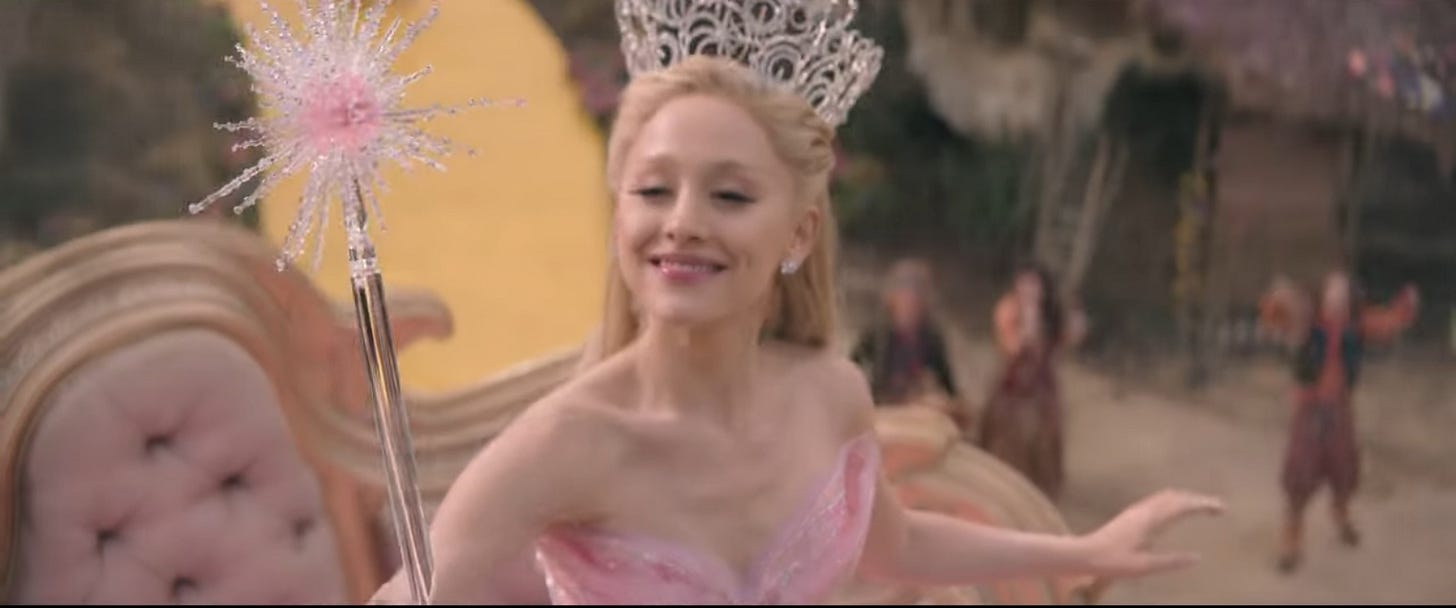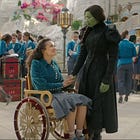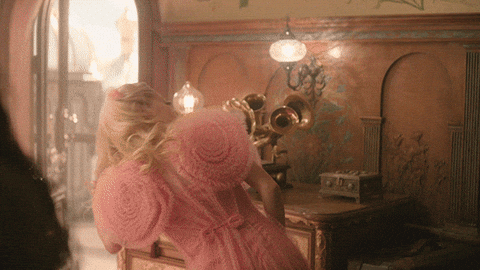Glinda’s Liberalism In ‘Wicked’ Is Popular But Not Very Good
Our ‘Wicked’ week continues.
Wicked is a deliberately political work that explores themes that are very much relevant today. That’s both impressive and depressing. Glinda the self-styled Good Witch is a compelling commentary on American liberalism, but she’s initially painted with a conservative brush. She’s well-off, entitled, and snobbish. She gasps in horror at her future roommate Elphaba’s physical difference and then graciously offers to “fix” her through a magical version of “praying the green away.” She dismisses the critical theories in her professor’s lecture: “Why can’t you just teach us history, instead of always harping on the past?”
Conservative-coded villains are easier to boo and root against. They freely reflect our worst impulses while lacking any pesky inner conflict. We can laugh at Glinda’s Regina George moments without feeling complicit. Liberal-coded villains confront us with our own flaws, blind spots, and weaknesses.
“Villain” is an admittedly harsh descriptor for Glinda, as it suggests her actions and motivations are “evil” rather than simply self-centered. “Foil” seems more fitting. Glinda’s a stark contrast to the story’s hero, Elphaba. Yet, she’s more than Han Solo to Elphaba’s Luke Skywalker. She personally challenges Elphaba in ways that the actual villains don’t yet do until relatively late in the story (midway through the musical and at the climax of the first movie).
The Ozdust ballroom scene, which Wicked’s creators consider the “heart of the movie,” is when Glinda transitions from the story’s primary antagonist. She’s set up Elphaba for public ridicule but instead of savoring her victim’s humiliation, she feels shame and remorse. She uses her social standing and influence to save Elphaba.
However, even when she decides that she’s Elphaba’s new best friend, she doesn’t immediately treat her that way. “Can I call you Elphie?” she asks without waiting for an answer. Elphaba rightly think it’s “too perky,” but Glinda keeps the nickname.
Although the Wizard’s “Wonderful” is the musical’s more overt villain song, “Popular” is a stealth one. (It’s also the only villain song in Wicked: Part 1). In Hamilton’s “Aaron Burr, Sir,” Burr offers Alexander Hamilton friendly advice that forms the basis for their conflict: “Talk less. Smile more. Don’t let them know what you’re against or what you’re for.” Glinda does the same in “Popular,” which begins with Glinda announcing that Elphaba is her new “project,” an explicitly liberal-coded declaration. When Elphaba says, “You really don’t have to do that,” Glinda responds, “I know! That’s what makes me so nice!” This song was composed during the George W. Bush administration, but even his supposed “compassionate conservativism” had no real interest in “nice.”
“Whenever I see someone less fortunate than I, and let’s face it, who isn’t less fortunate than I?” Glinda says, demonstrating better grammar than she usually does. “My tender heart tends to start to bleed.” (“Bleeding heart” is a longstanding pejorative for liberals.)
And when someone needs a makeover
I simply have to take over!
I know, I know exactly what they need!You’re gonna be popular!
I'll teach you the proper poise
When you talk to boys
Little ways to flirt and flounce
Ooh!
I'll show you what shoes to wear!
How to fix your hair!
Everything that really counts to be
It’s easy to assume that the song reflects Glinda’s transformation from “mean girl” enemy to friend, but it’s actually a transition to a more dangerous sort of antagonist. Like Lord Henry in The Picture of Dorian Gray, Glinda at this point is a satanic figure, seeking to lure Elphaba from the righteous path. Her motivation isn’t malicious but the result is still morally destructive.
Glinda believes the only way Elphaba can ever advance in the world is by becoming an entirely different person. She believes the image we present to the world is all that matters, even if ultimately false. You must become the mask. Glinda shares this cynical world view with the story’s main villain, and she almost succeeds where he ultimately fails.
“When I see depressing creatures with unprepossessing features,” Glinda says. “I remind them on their own behalf to think of celebrated heads of state or specially great communicators! Did they have brains or knowledge? Don’t make me laugh! They were popular!”
This is a mirror of the true villain song, Wonderful, when the Wizard — a fraud who’s conned a gullible populace into embracing a fascist state, if you can imagine such a thing — tells Elphaba, “Where I’m from, we believe all sorts of things that aren’t true. We call it ‘history.’ A man’s called a traitor or liberator. A rich man’s a thief or philanthropist. Is one a crusader or ruthless invader? It’s all in which label is able to persist.”
After Donald Trump won a second term, many Democrats quickly embraced Glinda’s “popular” theory of politics: We must pursue popularity or we’ll keep losing elections. It’s hard to argue against that logic until we ask ourselves how much we have to change and who we have to sacrifice for popularity.
Glinda’s liberalism never exceeds her discomfort. When Oz’s own version of the Gestapo drags off Dr. Dillamond, who’s committed the crime of existence, Elphaba asks her classmates if they’re just going to sit in silence. Glinda does just that. She later publicly changes her name from “Galinda” to “Glinda” in “solidarity with” Dr. Dillamond and to “express [her] outrage.” It is obvious performative allyship.
Elphaba invites Glinda to join her in the Emerald City and meet the Wizard. When they both learn the truth about him and his evil regime, Glinda urges Elphaba to calm down, listen, and collaborate with fascism … straight-up, flying monkey army fascism (a notch below what the United States is about to experience).
Glinda is a self-proclaimed Good Witch who is not that good. She’s flawed and imperfect, and while that doesn’t make her irredeemable, Elphaba must ultimately reject what Glinda offers and represents.
“Just say you’re sorry,” Glinda pleads. “You can still be with the Wizard. What you’ve worked and waited for. You can have all you ever wanted.”
Elphaba knows this, but she rejects it anyway, choosing the life of a fugitive and outcast. It’s far from comfortable, but at least it’s honest. Glinda has followed her to potential glory, all but wearing an “I’m with her” button, but she won’t follow her into true jeopardy. Instead, she embraces the lie. She’ll probably even enjoy a pleasant, non-confrontational holiday dinner with the Wizard and Madame Morrible.






Saw Wicked last night. Never saw the play and didn't know what to expect. I was (sort of) able to get past the popular girl BS, the shoddy treatment of the sisters and the blatant prejudice of someone of a different color. But when Wicked devolved into a Trumpian dystopian nightmare - "the best way to bring folks together is with a real good enemy" - through lies and disinformation, that broke me. Your analysis is very solid and encapsulates Glinda beautifully. Thanks for giving me some place to share this.
[After Donald Trump won a second term, many Democrats quickly embraced Glinda’s “popular” theory of politics: We must pursue popularity or we’ll keep losing elections.]
I don't really want to win the approval of the evil or dumb (or both) motherfuckers who voted for Trump. Let them stay in the den of the face eating leopards they have chosen.
Invest the time, emotional commitment, and effort in the people who wanted a better world and were let down by America.
I don't know if that makes me a villain or not.
If you can't save everyone, I'd rather try to save the ones who want to be saved.